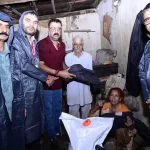Transition from school to university/college life is one of the most challenging events in a students’ life. Students entering a new institutional setting, invariably come with diverse aspirations, mindsets, thoughts, backgrounds and preparations. As they enter a relatively unfamiliar environment, with most of them have little knowledge of a university/college. An essential approach is to welcome the new students to higher education and prepare them for their new role. Till 2019, no significant effort was done across most institutions, except for an orientation programme lasting a couple of days. In this backdrop, student induction is designed to help the whole process.
The orientation programmes conducted in the universities were specific to the departments/faculties and would concentrate on making students aware about resident instruction guidelines pertaining to the academic and research programmes without any focus on socialising and immersing the students in new culture and providing for any associative interface with students and faculty members from other departments/faculties. This would create students, that were invariably, less socialised, less mindful of the purpose of their education and students without any sizeable appreciation for their role play in the society.
Purpose of foundation program
With the unveiling of National Education Policy, that sought a paradigm shift in the way higher education institutions design and deliver their programmes with a larger purpose of creating human resource that can lead India towards its goal of Viksit Bharat by 2047, that demands holistic leadership in science and technology with a matching appreciation of regional and global issues. The system of education, even though having been the cornerstone of India’s development in science and technology, has largely failed the country to harness its true potential despite its scale. Exposing incumbent students to their purpose of education and how they can align their aspirations with the vision and mission of the institution can help a great way in holistic development of students and prepare them for new roles in the society driven by their academic excellence.
The purpose of Foundation Programme is to help new students adjust and feel comfortable in the new environment, inculcate in them the ethos and culture of the institution, help them build bonds with other students and faculty members, and expose them to a sense of larger purpose and self-exploration. The process encompasses the whole process whereby the new students learn to adjust and acclimatize to their new roles and environment. Induction process should be a meticulously planned process to educate the incumbents about the vision, mission and broader goals of the institution, make them aware about the environment and ecosystem of the institution, and connect them with the people both students, faculty and administration. Thisprogramme engages the new students as soon as they enter into the institution, before thestudents begin their regular class work. The incumbents are acquainted about the institutional policies, processes, practices, culture and values, and their mentor groups are formed.
The Foundation programme comprises four main elements including Socialising- opportunity to meet new friends, faculty, alumni and eminent people, , Associating- Getting a glimpse of the campuses, departments, laboratories and infrastructure on campuses, local area, culture etc. , Governing-Getting insights about the academic ecosystem, rules and regulations, student support etc of the institution and Experiencing-motivational speeches, life changing journeys, study skills, small-group activities, physical activity, creative and performing arts, literary activities, universal human values, etc.
National initiatives towards student orientation
University Grants Commission (UGC) initiated brainstorming on the concept of Foundation programme in 2018 under the name “Induction Programme” with a purpose to help students acclimatise with the new institutions, culture and ecosystem as well as develop bond with fellow students and teachers, inculcate sensitivity towards various issues of social relevance and imbibe human values so as to become the responsible citizens. A well-designed foundation programme will surely set the pace of fruitful teaching-learning experiences. UGC also rolled out the guidelines of the induction programme for institutions of higher learning.
IRTIQA: SKUAST-K‘s Unique Foundation Program
SKUAST-K proposed the immersive orientation of fresh students well before it was unveiled in NEP-2020. In 2018, our Institutional Development Plan proposed a two week to one month Foundation Programme that was aimed at bridging this gap among the students of understanding and exploring themselves and how the institution can help them harness their potential and create their best versions. Our foundation programme is a uniquely designed 4-week festive-cum-immersion program for integrating multiple stream students at the beginning of admission that is aimed at instilling life skills, identify the diverse potentialities and create a platform for students to learn from each other’s life experiences. It will comprise of sessions from Alumni, business leaders, outstanding achievers in diverse fields, and people with inspiring life experiences.
During the programme the students know about the operational framework of academic process in the university, the challenges of being a science student and the opportunities that they can explore in life. SKUAST-K has demonstrated the impact of this program with outstanding feedback about the program on student mindset, ability enhancement, socialisation, as well as a greater sense of belonging to the profession as well as institution. Our Foundation Programme’s broader imperative is to help a new entrant in adapting to newplace, culture, and university as well as improve various life and social skills.
Our operational framework of Foundation Programme is:
- Knowing your University/faculty: Students are familiarised with the University, the faculty and the programme of studyalong with the physical infrastructure; including laboratories, workshops, ICT facilities and other ambience.Focus is to help them familiarise with differences between college life and school life along with career prospects offered by specific courses.
- Knowing Kashmiri Culture: Students are exposed to culture and art forms like painting, sculpture, pottery, music, dance etc. These provide for creative expressions that should hopefully, flow into their academic journeyand alsodevelop a sense of aesthetics.
- Engage with Eminent Leaders: Under this we organise lectures by eminent people from diverse backgrounds including academics, art, business, politics, journalism, research, administrators as well as other walks of public and social service.
- Build appreciation for social responsibility: Weorganize a visits to a monuments or a landmark of the city, like a picnic, for bonding, or visits to a hospital or orphanage. This exposesincumbents to the broader social issues.
- Engage in Extra-Curricular Activities: The new students are introduced to the extra-curricular activities at the college/university. They are acquainted with the facilities and activities related to different clubs etc. Various club leaders and senior are involved in leading these activities to build a sense of belonging.
- Student competitions: Students are involved in various competitions such as singing, drama, skits, art, painting, speeches, mock parliaments, poetry etc to explore individual competencies outside academic activities. This helps students to identify themselves and builds confidence of public appearances.
IRTIQA-From a SKUAST-K initiative to National framework
In 2023, SKUAST-K presented the broader contours of its working model of NEP including the Foundation Programme. Driven by the innovative operational framework of SKUAST-K model. ICAR’s Sixth Deans Committee headed by Prof Tej Pratap unveiled the draft report of committee on May 10, 2024 for implementation of NEP. Driven by the SKUAST-K framework, the committee proposed two credits (0+2), two week non-gradial immersion programme named “Deeksharambh” to be offered at the beginning of first semester.
This programme is expected to create a platform for students to learn from each other’s life experiences, help for cultural integration of students from different backgrounds, know about the operational framework of academic process in university, and instilling life and social skills, social awareness, ethics and values, team work, leadership, creativity, etc. It will also help in identifying the traditional values and indigenous cultures along with diverse potentialities both in indigenous and developed scenario.
The contours of the programme are invariably same as proposed in our Working Model. Since 2022, SKUAST-K has conducted two Foundation programmes IRTIQA-1 (2022) and IRTIQA-2 (2023)and demonstrated the potential of this unique fest to socialise, engage and immerse students from diverse backgrounds, create awareness about institutional vision, mission and value systems as well as academic regulations and on a larger scale create awareness about individual potentialities, appreciation of role plays and build confidence towards future leadership of taking J&K and country towards next level of development driven by science.
(The Author is Professor & Head, SKUAST-Kashmir)








